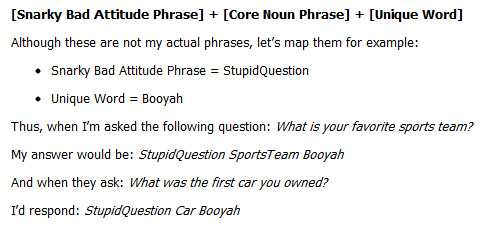How to create security questions nobody can guess
A problem that is very much concerned about is how to restore online accounts. A typical security option is to set up a security question. This has the ability to recover your account quickly and easily, but also requires a security responsibility from the user.
Some websites have realized that standard security questions, such as 'What is your mother's maiden name?' or 'What's your pet's name?', it's easy to find the answer, even for strangers. For example, the case of a person who broke into dozens of well-known email accounts recently reported. Basically, this person can access the email accounts of the stars by guessing the email address, password and finding answers to security questions.
The same thing happens to ordinary people. A person with bad intentions can cause a lot of trouble if they have access to your online account. Better yet, you should be prepared for the worst situation and prevent bad guys from having the opportunity to harm you with online password protection measures. Thankfully, most websites now allow users to ask customized security questions.
What makes a good security question?
First and foremost, you will have to choose a security question that is difficult to predict or find for both strangers and people you know. On the other hand, the answer must be easy to remember for yourself. Note that you may have to answer the question in a few years. The answer will not change over time so make sure that at least you will be able to answer these questions correctly in the future.

Keep in mind the 3 basic principles after choosing a security question:
- Difficult to guess or find out
- Easy to remember
- Do not change over time
For additional principles and more detailed notes for each principle, as well as examples of good and bad security questions, invite readers to move on to the next section.
Additional criteria for safety security questions
Based on these basic principles, you can create pretty good security questions. However, when you add additional criteria, your question will become stronger. For example, an ideal security question has many potential answers, but in accordance with Principle 1, only you know the real answer. In addition, besides the unpredictable factor, the answer must be short and simple, otherwise it will not guarantee easy-to-remember rules.
Finally, in order not to affect Principle 1, you should never accidentally answer this question anywhere. This can be a conscious effort or you just need to choose a question that no one can think of asking you to answer in any situation.
In summary, these are additional criteria for a security security question:
- The question has many potential answers, but there is only one clear answer for you (principle 1);
- Short and simple answers (principle 2);
- Questions will not be asked randomly, for example: in a game (principle 1).

Examples of safety security questions
It is difficult to give an example of a secure security question because a secure security question is often very personal and often cannot be applied to everyone. However, here are three examples and why they are security questions.
What is the name of the teacher who gave you the first A grade?
If you have a very high or very low score when you go to school, you can remember the teacher and the subject. Unless you brag about this, this detail will be difficult for others to find. Also, if you have never received that specific score, the answer may be meaningless, such as 'never happen'.
What is the name of the city where you got lost?
It is this vague question that creates a good security question, provided you have never shared it extensively with others. In general, the events you shame on and never tell anyone about them create a great security question.
What is the name of the middle name?
Since most people don't like their middle names and often don't use them online, this answer is hard to find.
Creative answer to security questions

Questions with real answers can always be answered in some way. To really increase security, especially on sites that do not offer custom security options, you can do what Apophenia's blogger Danah Boyd suggests and create your personal algorithm for sentences. ask security. In other words, you create a primary key for security questions that function as an answer. That way, you just need to remember the primary key to answer any security questions you'll set up.
See more:
- Cloud computing and 10 common security questions
- Instructions for resetting Apple ID security questions
- Questions to retrieve unsafe webmail passwords
- Summary of how to create strong passwords and manage the most secure passwords
You should read it
- ★ Multiple choice questions about network security implementation have the answer P5
- ★ Multiple choice questions on network security deployment have the answer P4
- ★ Multiple choice questions about network security deployment have answers
- ★ Multiple choice questions on network security implementation have P3 answers
- ★ Multiple choice questions on network security deployment have the answer P6